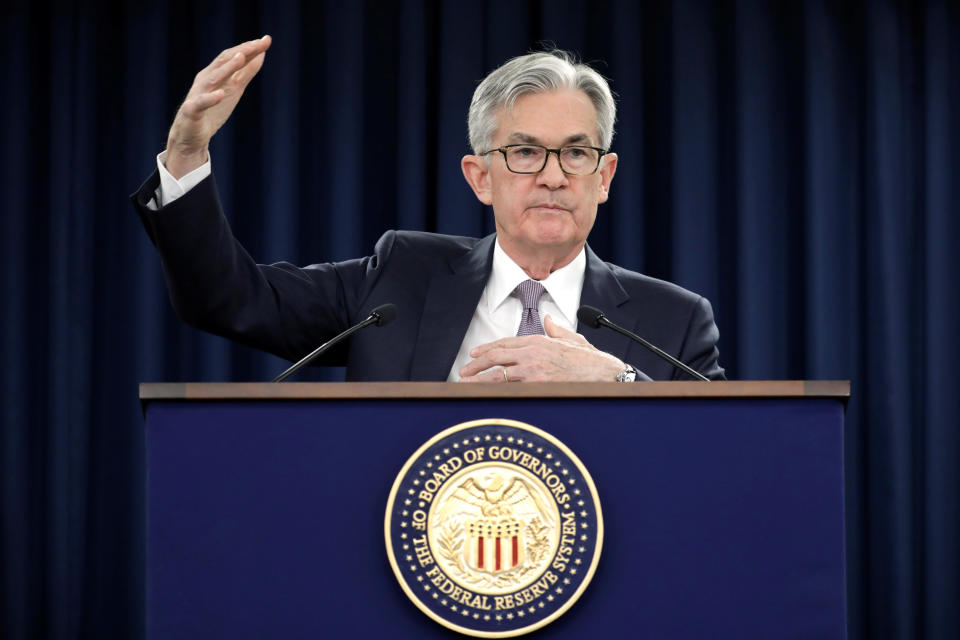Powell: 'Hard to say' if balance sheet expansion is affecting risk assets

Federal Reserve Chairman Jerome Powell reiterated Wednesday that the ongoing expansion of the Fed’s balance sheet is not designed to affect risk assets.
“It’s very hard to say what is affecting financial markets with any precision or confidence at a given time,” Powell said in response to a question from Yahoo Finance. “It’s not our intention to change the stance of monetary policy.”
On Wednesday, the Fed held rates steady in the current range of 1.50% to 1.75%. With no action on rates, the Fed statement also provided no new timeline on the Fed’s current $60-billion-a-month pace of short-term Treasury bill purchases. As the central bank telegraphed at the end of last year, the purchases will continue “at least” through the second quarter of this year.
The Fed began the purchases in October after a flare-up in money markets where a scarcity of available overnight cash bid interest rates well above the central bank’s target range. Policymakers acknowledged that the Fed’s process of shrinking the balance sheet may have left too few reserves flowing in the repurchase agreement market and the financial system at large.
Powell said Wednesday that at some point the Fed will deem its balance sheet large enough to support “well-functioning” money markets. At that point, Powell said the Fed will “gradually reduce” its asset purchases to a pace that matches the “trend growth” of demand for liabilities on its balance sheet.
Powell did not provide a number on when the Fed would make that change, only saying that the Fed would set a floor of $1.5 trillion as the “bottom end” of the range. As of Jan. 15, the Fed balance sheet was holding about $4.18 trillion, leaving about $1.67 trillion in aggregate reserves in the banking system.
“We’re committed to making this adjustment process a smooth one,” Powell said. He added that the Fed would be ready to “adjust the details of the plan as necessary.”
Earlier in the day, former New York Fed President Bill Dudley wrote an op-ed for Bloomberg saying he was “skeptical” that the Fed operations were to blame for the higher stock market.
“Just because two things are moving together doesn’t mean that one causes the other,” Dudley wrote.
Repo through ‘at least’ April
Since the repo market episode in September, the New York Fed has offered its own repo facilities to provide banks and broker-dealers with overnight funding. At the time, the Fed had said it would provide the operations at least through January.
But the Fed said Wednesday that it would be extending its overnight repurchase agreement operations at least through April.
Powell said its T-bill purchases and repo operations should support “ample” reserves to support spikes in the Treasury General Account (TGA) during the April tax season. Tax payments made to the Treasury represent some of the non-reserve items on the liabilities side of the Fed’s balance sheet.
The New York Fed has already begun “gradually” reducing its repo operations.
As of Jan. 1, the Fed was offering $255.6 billion in repurchase agreements. As of Jan. 22, the Fed was offering $186.1 billion.
Powell said the Fed could still offer some repo operations as a “backstop” even after it slows its pace of balance sheet growth. Powell added that the Fed has not yet made a decision on a “standing” repo facility that would offer liquidity at all times, as opposed to the current structure in which repo operations are only conducted at certain times of the day.
Powell stressed that the adjustments are to assure that policy rates are “transmitted smoothly” to the market.
“That doesn't mean we’re trying to eliminate all volatility in the repo markets. We know that some volatility is normal and expected in well-functioning markets,” Powell said. “These adjustments have been successful in supplying an ample quantity of reserves.”
The Fed’s next policy-setting meeting will take place March 17-18.
Brian Cheung is a reporter covering the banking industry and the intersection of finance and policy for Yahoo Finance. You can follow him on Twitter @bcheungz.
Fed Chair Powell: Coronavirus will affect Chinese economy 'in the short term'
Fed holds rates steady in first meeting of 2020 as economy extends expansion
Fed to start 2020 with heavy scrutiny on the meaning of 'liquidity'
Trump has tweeted about the Fed 100 times since nominating Jerome Powell
'This is the new normal': California businesses pessimistic on phase 2 deal
Read the latest financial and business news from Yahoo Finance
Follow Yahoo Finance on Twitter, Facebook, Instagram, Flipboard, SmartNews, LinkedIn, YouTube, and reddit.

 Yahoo Finance
Yahoo Finance 
